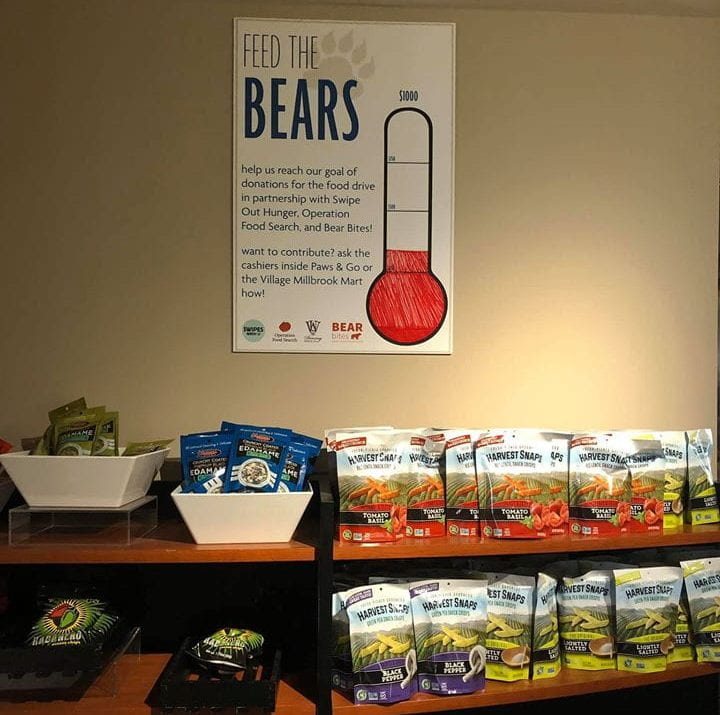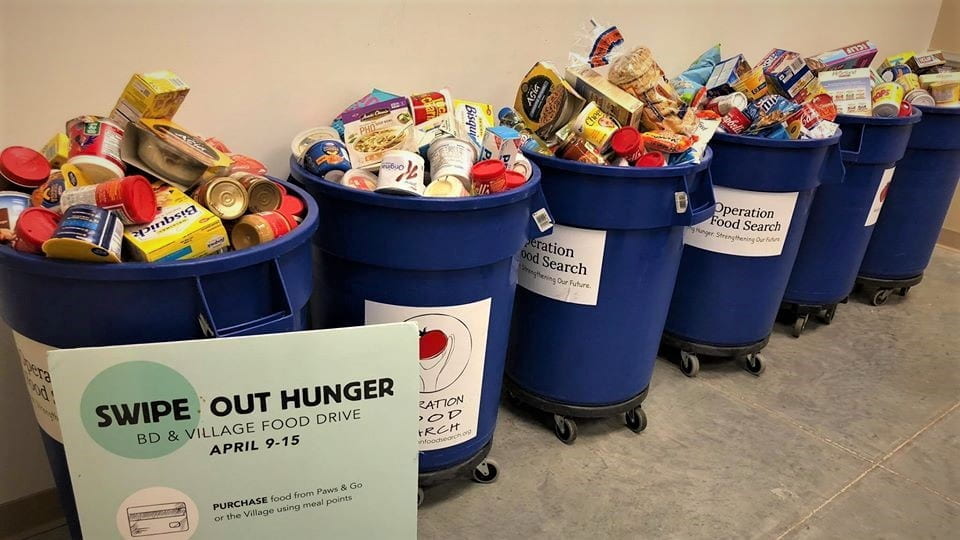Updated February 2022: Bear Bites is no longer running and there is no plan to reopen. Dining Services maintains the Food Security Fund to ensure no students go without meals. Any questions regarding the Food Security Fund can be directed to diningservices@wustl.edu.
According to a 2018 study published by Bon Appetit Management Company – WashU’s main Dining provider – soaring tuition costs and inadequate financial aid have caused food insecurity among students to rise. The growing gap between students’ basic needs and what they can afford has forced many to sacrifice their basic needs in order to meet these other high costs. This is a problem across higher education, including at wealthy and prestigious institutions such as WashU.
Groups that tend to be disproportionately food insecure at colleges and universities are also the more economically and socially vulnerable: students of color, first-generation students, students from the foster care system, international students, students who identify as LGBTQIA+, for example. For these students who are already most impacted by inequalities and injustices, food insecurity is an added detriment to physical health, mental health, and academic success.
The paper also finds that the students who are the most susceptible to food insecurity are the least likely to ask for help. Because of this, the problem is a whisper, a quiet plague that takes its toll on the most modest of students.
But it doesn’t have to be.
In response to student leaders expressing concerns for their food-insecure peers, the Brown School Academic and Student Affairs conducted a survey in the fall of 2018, revealing that there was a significant need to address food insecurity in the Brown school community.
Eager to address this problem, a handful of Brown School staff and faculty, including Associate Professor of Public Health Amy Eyler; Assistant Dean for Student Affairs Danielle Bristow; Assistant Director of Financial Services Katie Noonan; and Assistant Director for Student Engagement Zach Romo, collaborated to create the Bear Bites Food Support Program pilot. Bears Bites is WashU’s first stop-gap measure for addressing food-insecurity among students from the Brown School.
Bear Bites Food Pantry
Bear Bites aims to assist students facing uniquely challenging barriers to obtaining support from other existing school and state resources. The program is available to any Brown School student who registers via an anonymous online form, allowing them to obtain nutritious food easily, including shelf-stable foods that can be readily eaten or used to produce meals.
While Bear Bites is a great measure to address immediate food insecurity needs, the Brown School acknowledges that it doesn’t tackle the root of the problem, naming financial vulnerability for a large portion of the WashU graduate students. In the long term, the School is committed to developing more robust scholarship and fellowship support.
Understanding the shortcomings of Bear Bites, Brown School students are also offered assistance to apply to Missouri’s Supplemental Nutrition Assistance Program (SNAP), which is a longer-term form of support.
The efforts from the Brown School have quickly been seconded by Dining Services, who expanded its food donation program in the fall of 2019 to serve WashU undergraduate students.
“Feed the Bears” Food Drives
Most students living on campus know about the big blue bins that appear outside of Paws and Go and Village Millbrook Mart nearing the end of semesters. The food drives are organized by the WashU student group Swipe Out Hunger, in collaboration with Dining Services, and benefit Operation Food Search, a local nonprofit that feeds the hungry in Missouri and Illinois. To participate, all one has to do is purchase some nonperishable items with their meal card, then drop the food into the blue bins on their way out.
At the end of the 2019 fall semester, however, students noticed that there was something different about the food drive. There was now a paper list of desired items propped up on the counter, and an impressive assemblage of said items arranged beside it. Instead of purchasing items to put directly into the bins, customers were invited to “pre-order” items: when making a purchase, one could simply tell the cashier what they would like to purchase, and get 10% off said purchases. No need to carry them out to the bins anymore.

Outside the stores, the blue bins were not filling up as quickly as the previous years. It was easy to look on with a frown, but a “Feed the Bears” meter placed outside of Paws and Go and Village Millbrook Mart indicated otherwise. The goal was to achieve $1,000 dollars, and the donations quickly exceeded this amount. By the end of the two-week food drive, Dining Services and Swipe Out Hunger had collected nearly $1,500 worth of donations! The food was divided between Operation Food Search and Bear Bites, helping both WashU students and the greater community.
Food Security Fund for the future
With the triumph of the “Feed the Bears” came a strong desire for creating a more sustainable and reliable resource for food insecure students on campus. The outbreak of COVID-19 and the decision that followed to shift the remaining of the spring semester online ended up expediting this process.
During Spring break, students were given the options to be refunded for their unused meal points, or to donate some or all of these meal points to address campus food insecurity – and the students delivered. Within five days, $75,000 were collected from over 300 students!
While a portion of these funds were used to address the immediate needs of students that remained on-campus, Dining Services intends to use these dollars to start the new food security fund in the fall. This fund, with its goal of using financial aid to close the gap for food-insecure students, would be a permanent fixture of WashU’s administration, a huge step in the right direction for addressing food insecurity on WashU’s campus.
The WashU student body has shown as tremendous level of support for fighting food insecurity on our campus. The newly created food security fund will allow Dining Services to ensure that all WashU students can thrive without having to worry about their next meal.
Andrew Watling, Associate Director of Dining Operations at WashU
From the first concerns expressed by WashU grad students, to the perspective of a new fund that supports our future, WashU has come a long way in addressing food insecurity among students. None of this could have happened without the fruitful partnerships between students, staff, faculty, as well as local organizations. However, there is still much more to do, and this unified mission shall remain a priority.
Resources for students
- Brown School students who wish to access the Bear Bites food pantry, please contact Da’Shaun Scott. If you are a student outside of the Brown School, we encourage you to reach out to your program’s Financial Aid office to explore all options available to you for support.
- To receive support enrolling in the Missouri’s Supplemental Nutrition Assistance Program (SNAP) or to receive financial support, students may contact the following offices:
This article was written by Jarea Fang, Communication Associate at the Office of Sustainability.
This article was updated to reflect changes in Brown School staff.
